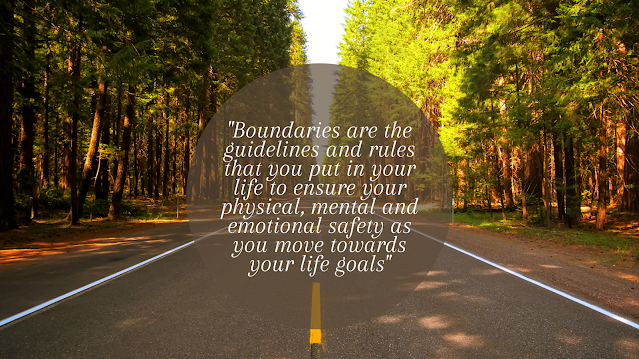Understanding Boundaries
A lot of people struggle with understanding what boundaries are and how to set boundaries. The reason behind this is, in childhood we were not modeled clear boundaries by parents or our boundaries were consistently ignored and violated.
In this post, we will begin to unpack the purpose of boundaries, types of boundaries, and what is within our boundaries that we have control over.
What Are Boundaries?
"Boundaries are our own personal limitations which allow us to have space between us and other people." Some people say Boundaries are like property lines. They define what is us and what is not us. Boundaries say “this is me and my property” and “this is not me and not my property.” Now if something is your property, it’s your responsibility. The same applies to boundaries. It helps you know what is your responsibility and what you need to take ownership of; what isn’t your responsibility and what you don’t need to take ownership of.
Types Of Boundaries:
- Physical Boundaries: Boundaries around our physical limits and personal space needs. Proximity, touch, unwanted comments, regarding appearance or sexuality.
- Emotional Boundaries: Boundaries around inappropriate topics, emotional dumping, and dismissing emotions also like how you feel, whom to engage with, and what parts of yourself you comfortable sharing with.
- Mental Boundaries: Boundaries where one has the freedom to have their own thoughts, beliefs, values, and opinions.
- Spiritual Boundaries: Boundaries around religious and spiritual experiences, beliefs, values, and conversation.
- Resource Boundaries: Boundaries around time and energy.
- Material Boundaries: Boundaries around possessions, materialistic things, when they can be used, and how they should be treated.
What's Within My Control: Boundaries
Now, let's talk about what things are within our control – things that are within our boundaries. There are a few things that we must take ownership of. Like: Our thoughts, feelings, attitudes, believes, values, desires, behaviors, decisions, actions, and materialistic things in our possession. However, here we’re going to focus on just a few of these.
- Thoughts – No matter the circumstance, you get to decide what you think about a circumstance. Two people can go through the exact same set of circumstances but interpret them entirely differently, creating two radically diverse sets of thoughts.
- Feelings – Feelings are the result of your thoughts, which are how you interpret your circumstances. A lot of people discount the importance and role of feelings, especially within the realm of religion. While we cannot allow feelings to be in the driver’s seat of our lives, we cannot throw them in the trunk of the car, ignoring them in our lives. How you feel is your responsibility, regardless of the circumstance. Once you take ownership of them, you can begin to figure out what thoughts (and ultimately, circumstances) created your feelings. Then, you can change those thoughts… and possibly change the circumstances as well.
- Attitudes & Beliefs – Attitudes are how you orient yourself towards something and how to perceive it. Beliefs are the things that you accept as true. It’s really easy to blame other people when really it’s our attitudes and beliefs that are causing pain in our lives. Nobody can pick your attitude or decide what you believe. That’s on you.
- Behaviors & Decisions – We make decisions and act based on how we think those decisions and actions will make us feel. Unless we are under the Imperius Curse of a Death Eater from Harry Potter, we get to pick how we respond or react to a situation. You don’t get to blame anyone else for the decisions you make and the way you behave.
Emotionally healthy people hold boundaries and also respect the boundaries of others. They have the emotional maturity to understand we each have our own limits and those limitations are not being rude or mean to others. While setting Boundaries some people might feel guilty, afraid, or confused if they have the right to set those boundaries or not. Just remember these feelings comes from codependency and with practice, we all can evolve to accept boundaries as a part of our Self-Worth.
Light, Growth & Transformation 💓

Comments
Post a Comment